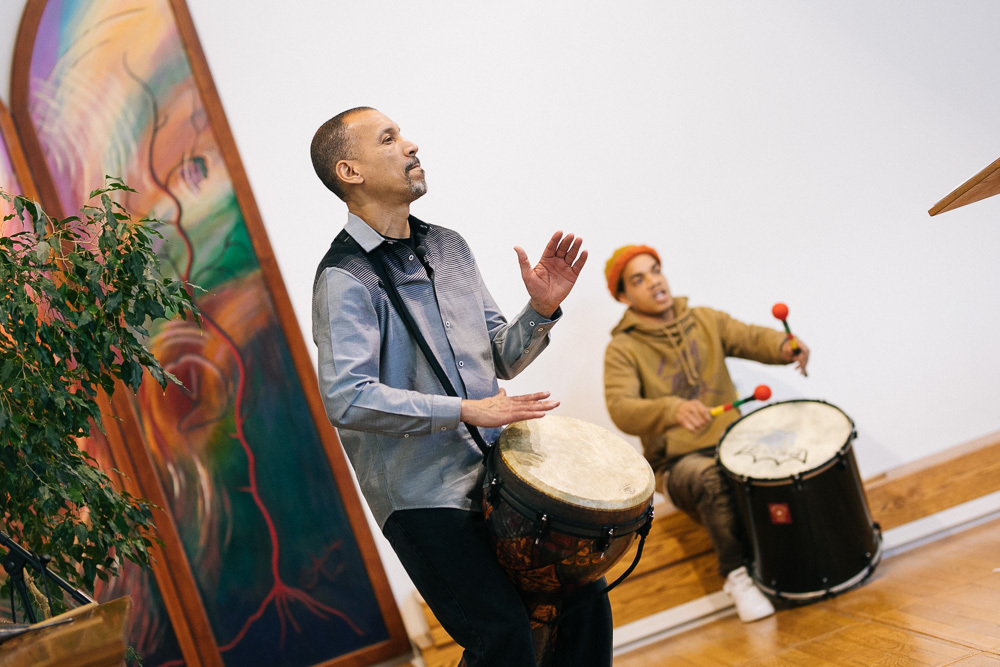Most participants in Timothy Seidel’s workshop were captivated by the humorous image. In one drawing, a huge fish chased a school of smaller fish. In the second, tables had turned: the smaller fish were chasing the big fish.
“That second image there is what I think of when I think of community organizing,” Seidel told the group, gathered for the afternoon session of SPI Community Day at Eastern Mennonite University.

One thoughtful middle school teacher, who had driven several hours from Lancaster, Pennsylvania, had a different observation.
“Not all the fish in my classroom are swimming the same way,” he said, “and some of those fish are angry.”
Amid much laughter, there were also nodding heads.
Practical skills, positive energy
The interaction was SPI Community Day in a nutshell: thought-provoking discussion in an educational environment that emphasizes practicality and the experiences of those in the classroom, undergirded by the positive energy (and often good humor) of face-to-face interaction.
Seidel’s workshop was one of seven offered during the one-day event, which gave approximately 85 participants a taste of the learning opportunities and warm friendly environment of “SPI,” or Summer Peacebuilding Institute.
Since 1994, more than 3,200 people from 120 countries — and a wide variety of professions — have attended the summer program, gaining concrete strategies and practical skills in organization, facilitation, reconciliation, restorative justice, participatory arts, trauma awareness and much more.
During its four sessions in May and June, academically credentialed practitioners teach five- and seven-day courses that can be taken for personal skills growth and training or academic credit. Three-day workshops are also offered.
‘Drums No Guns’ founder offers keynote
One of those practitioners who will teach this summer kicked off the Community Day event.

A drum welcomed the group into Martin Chapel for a keynote address, interspersed with guided meditation and a lecture on racial healing, by Dr. Ram Bhagat, a Richmond-based educator and founder of Drums No Guns. In 2016, Bhagat was named Richmond’s Peacebuilder of the Year by the Richmond Peace Education Center.
More drumming ended the session, led by his son Shyamuu, who lives and drums in Colorado. Ten participants were lucky enough to enjoy a short bucket-drumming lesson that resulted in a soul-shaking version of the Bhagats’ signature beat, “Junkyard Jam.”
Bhagat, currently earning a postgraduate certificate in restorative justice, will teach Strategies for Trauma Awareness and Resilience (STAR) at SPI this summer.
Community Day participants: what they said
- Drew Miller, middle school principal
Miller’s middle school a few miles outside of Harrisonburg is working to instill a restorative culture model. Two teacher-leaders from Montevideo accompanied him to SPI Community Day.
His big takeaway from a session on conflict-competent leadership with Dr. Gloria Rhodes was a new perspective on conflict itself. “When used properly, fire can provide warmth and light, both positive things,” he said. “When not handled properly, it becomes destructive. As I’ve dealt with conflicts this week, I’ve kept that in mind.”

He added that the concept of “quiet centeredness,” taught in a peace education session with Dr. Ed Brantmeier, of James Madison University, was also useful in addressing conflict and wrongdoing.
- Lance Brown, career coach
Brown, of Westwego, Louisiana, combined his SPI Day experience with an exploratory visit to Eastern Mennonite Seminary. A career coach with the social enterprise-based organization JUMA Ventures, Brown introduces young adults ages 18-24 to career planning, employability and financial management skills and part-time employment.
“I appreciated the focus on the power people have and the necessity of strategic work to accomplish the work of peacebuilding rather than simply peace-praying,” he shared later in an email. These “skills of reconciliation are necessary to the work of the Kingdom of God.”
Brown also appreciated the awareness and recognition of historical and systemic discrimination and oppression of people of color.

His experiences helped move him into his abiding questions: “How do I do theology in a way that liberates me and allows me to fulfill my God-given potential? How I interpret scripture in a way that doesn’t oppress human beings and/or prop up unjust and inhumane systems? And how do I develop the relevant skills to live out a liberating gospel worth practicing?”
- Rebeca Barge, director of programs, Big Brothers Big Sisters
Barge, a regular attendee of the summer institute, offered SPI Community Day as a professional development opportunity. Two staff and two Big Sisters attended.
“One big take away,” she reflected, “was the importance of understanding and naming the different aspects that make up an organization’s culture, and identifying the blessings and barriers of that culture. The other take away from the lunch plenary session was how important it is to re-design and re-frame the problems or issues we are trying to address within Big Brothers Big Sisters to have more buy-in from staff and stakeholders.”
